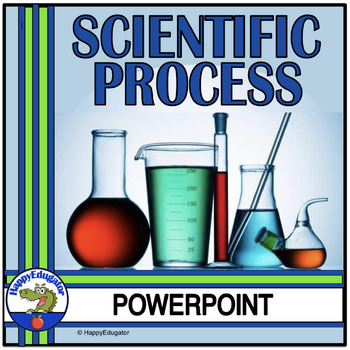The Scientific Method PowerPoint - Steps of the Inquiry Process
- PPTX
- Microsoft OneDrive
What educators are saying
Description
The Scientific Process, also known to students as the Scientific Method or the Inquiry Process, is important for students to understand before conducting any science project or research. This 36-slide PowerPoint introduces students to how to conduct science investigations using the scientific process. It begins with a little background on the history of inductive reasoning starting with Aristotle, and continuing with Copernicus and Galileo, and gives students examples of inductive reasoning and why hypotheses need to be tested as they may or may not be true. The Scientific Process here has seven steps as follows:
1. Ask a Question
2. Form a Hypothesis/ Make a Prediction
3. Design and Carry out an Experiment
(Materials and Procedure) (independent and dependent variables)
4. Record and Analyze Data
5. Draw Conclusions
6. Communicate Findings
7. Further Inquiry
The PowerPoint then gives an example of how the process would be used with a realistic example of an investigation. Editable for the specific needs of your classroom.
Did you know that you can use PowerPoints like this in video conferencing or Zoom for remote learning? You can share with your students in OneDrive and in Microsoft Teams, too. Just view in Slideshow mode. You can also upload to Google Drive and save as Google Slides, and it will automatically convert, and you can use it in Google Classroom. It is editable and easy to make adjustments if necessary.
Please see preview to see the slides. Note: Animations do not show on the preview.
Related Products
⭐ Science Fair Project with Project Based Learning Ideas and Science Experiments
⭐ Science Lab Safety Rules PowerPoint
⭐ Science Fair Experiment or Social Science Fair Project PowerPoint
Follow me HERE to get notified of updates, sales, free resources, and new products. All new products are 50% off for 48 hours.
© Deborah Hayes aka HappyEdugator. For classroom and homeschool use. Your purchase buys one license. You may purchase extra licenses at a discount.
Common Core State Standards. CCSS:
CCSSCCRA.L.6
Acquire and use accurately a range of general academic and domain-specific words and phrases sufficient for reading, writing, speaking, and listening at the college and career readiness level; demonstrate independence in gathering vocabulary knowledge when encountering an unknown term important to comprehension or expression.
VA SOL.6.1.a.2, VA SOL.LS.1.a.1, VA SOL.PS.1.a.2
The student will demonstrate an understanding of scientific and engineering practices by asking questions and defining problems, develop hypotheses and identify independent and dependent variables.
TEKS.SCI.6.2.B, TEKS.SCI.7.2.B, TEKS.SCI.8.2.B
Scientific investigation and reasoning. The student uses scientific practices during laboratory and field investigations. The student is expected to: design and implement experimental investigations by making observations, asking well defined questions, formulating testable hypotheses, and using appropriate equipment and technology.
DEBHG8RP
4276863





